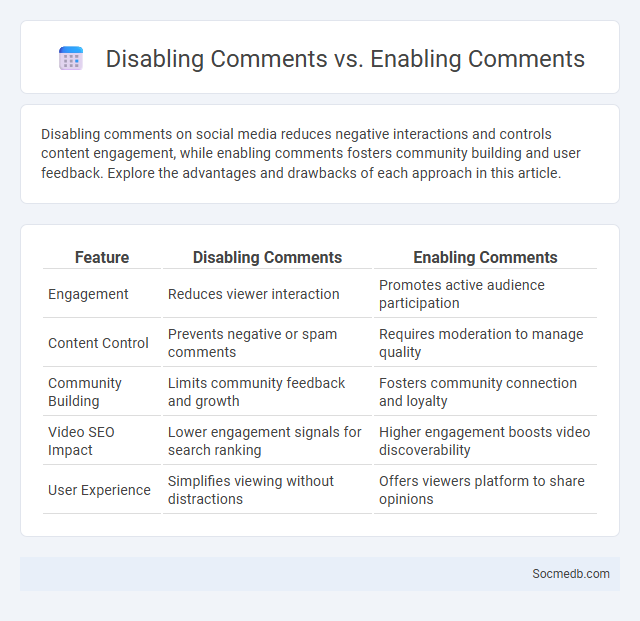
Photo illustration: Disabling Comments vs Enabling Comments
Disabling comments on social media reduces negative interactions and controls content engagement, while enabling comments fosters community building and user feedback. Explore the advantages and drawbacks of each approach in this article.
Table of Comparison
| Feature | Disabling Comments | Enabling Comments |
|---|---|---|
| Engagement | Reduces viewer interaction | Promotes active audience participation |
| Content Control | Prevents negative or spam comments | Requires moderation to manage quality |
| Community Building | Limits community feedback and growth | Fosters community connection and loyalty |
| Video SEO Impact | Lower engagement signals for search ranking | Higher engagement boosts video discoverability |
| User Experience | Simplifies viewing without distractions | Offers viewers platform to share opinions |
Introduction: Understanding Comment Strategies
Effective comment strategies on social media enhance user engagement by fostering meaningful interactions and building community trust. Analyzing comment patterns helps brands tailor responses, improve customer satisfaction, and increase visibility. Optimizing comment tactics contributes to brand loyalty and amplifies content reach across platforms.
Benefits of Enabling Comments
Enabling comments on social media posts increases user engagement by fostering interactive discussions and building a sense of community around the content. It provides valuable feedback and insights, helping businesses and creators tailor their strategies based on audience preferences and opinions. Comments also boost algorithmic visibility, as platforms prioritize posts with active user participation, enhancing organic reach.
Advantages of Disabling Comments
Disabling comments on social media posts significantly reduces the risk of negative interactions, such as trolling, harassment, and spam, thereby fostering a safer online environment. This feature helps brands maintain a positive public image by minimizing the spread of misinformation and off-topic discussions. Moreover, it allows content creators to focus on delivering their message without distraction, enhancing audience engagement through curated, controlled communication.
The Role of Comment Moderation
Comment moderation on social media platforms is essential for maintaining a positive and respectful online environment by filtering out harmful, spammy, or irrelevant content. Effective moderation enhances user engagement and protects your brand's reputation by ensuring discussions remain constructive and aligned with community guidelines. Implementing advanced moderation tools and AI-powered filters helps manage high volumes of comments quickly while upholding platform integrity.
Impact on Community Engagement
Social media platforms significantly enhance community engagement by facilitating real-time communication and enabling users to share ideas, events, and local news instantaneously. Features such as groups, hashtags, and live streaming foster active participation and collective problem-solving within diverse communities. This increased interaction strengthens social bonds, drives civic involvement, and promotes grassroots movements more effectively than traditional media channels.
Managing Online Trolling and Spam
Managing online trolling and spam requires proactive moderation tools and clear community guidelines to maintain a positive social media environment. You can leverage AI-powered filters to detect and block abusive content, minimizing its impact on user engagement. Regularly updating security settings and encouraging user reporting help safeguard your platform from persistent trolls and spam attacks.
Effects on Website SEO and Traffic
Social media significantly enhances your website SEO by increasing backlinks, boosting content visibility, and driving targeted traffic from diverse platforms like Facebook, Twitter, and LinkedIn. Engaging posts and shares improve domain authority and search engine rankings by signaling relevance and trustworthiness to Google algorithms. Leveraging social media analytics allows you to optimize content strategies, ultimately converting social traffic into higher website engagement and conversions.
Balancing Free Speech and Content Quality
Balancing free speech and content quality on social media platforms requires stringent community guidelines that protect users' rights while minimizing harmful or misleading information. Algorithms must prioritize authentic, high-quality content without suppressing diverse opinions, ensuring Your voice remains respected and safe. Effective moderation tools combined with user education foster a healthier online environment that supports open dialogue and factual accuracy.
Choosing the Right Approach for Your Platform
Selecting the right approach for your social media platform hinges on understanding your target audience's preferences and behavior patterns. Tailoring content strategies to platform-specific algorithms, such as Instagram's emphasis on visual appeal versus Twitter's focus on concise information, maximizes engagement. You should continuously analyze performance metrics to refine tactics and boost your digital presence effectively.
Best Practices for Comment Management
Effective comment management on social media involves timely responses to engage users and foster community trust. Utilizing moderation tools and keyword filters helps maintain a positive environment by reducing spam and offensive content. Consistently monitoring feedback and addressing concerns promptly enhances brand reputation and encourages meaningful interactions.
 socmedb.com
socmedb.com